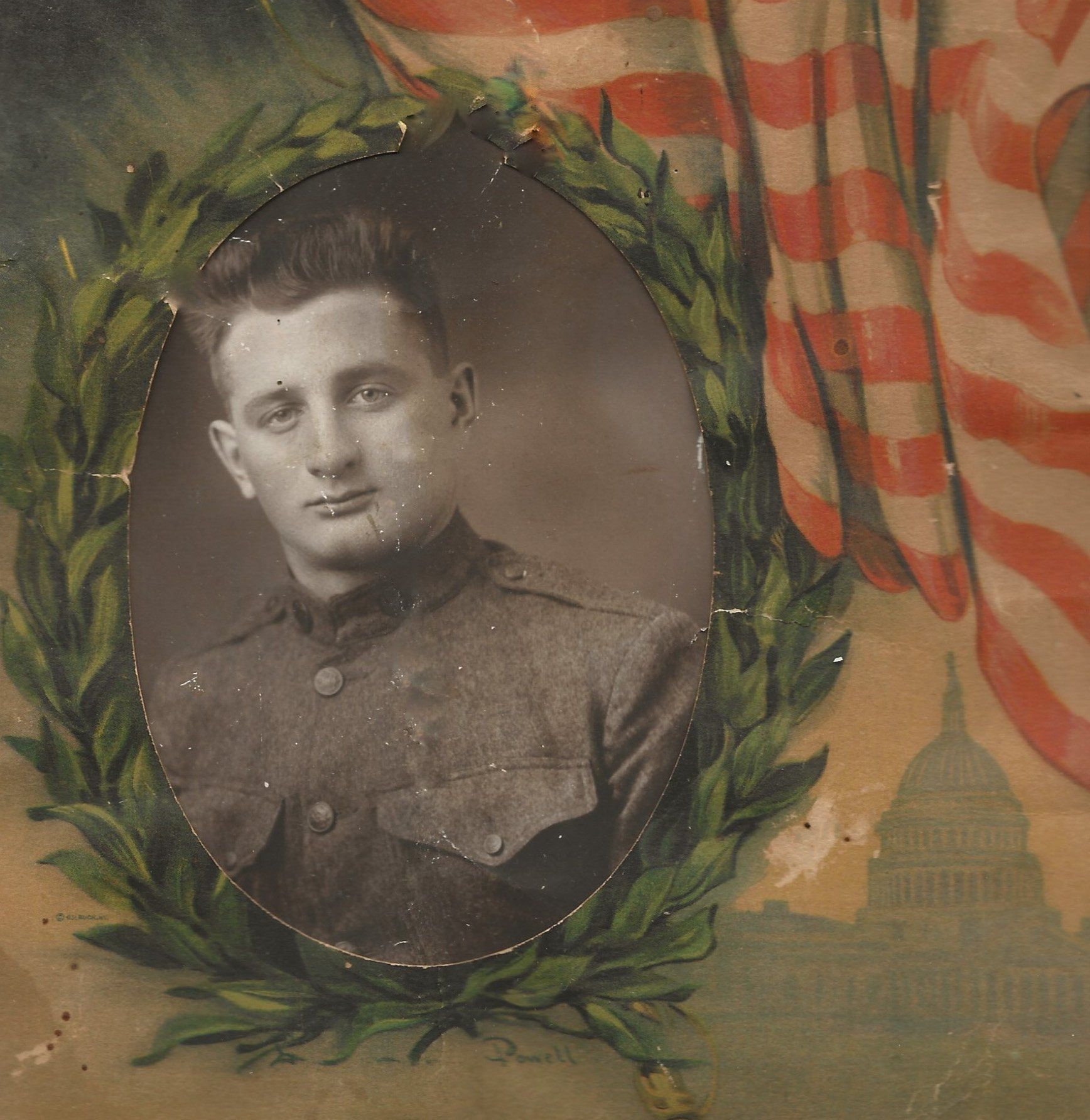
World War I George Mattas
and the
"Home Boys"
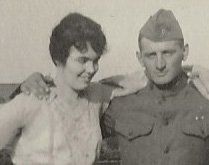
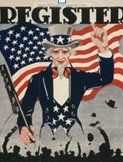
On April 6, 1917, the United States entered the "war to end all wars." May 17, Congress passed the Draft Law providing for the great National Army and the 89th Division was created. Men were drawn from South Dakota for that division, including George Mattas and many of his friends from Parkston and Milltown.
From that time, until George returned home in June of 1919, he sent his “girl,"Grace Adkins many letters and pictures. This month’s story is based on those, as well as mementos that are in the Adkins Family archives.
Grace Adkins and George Mattas. Circa, 1918
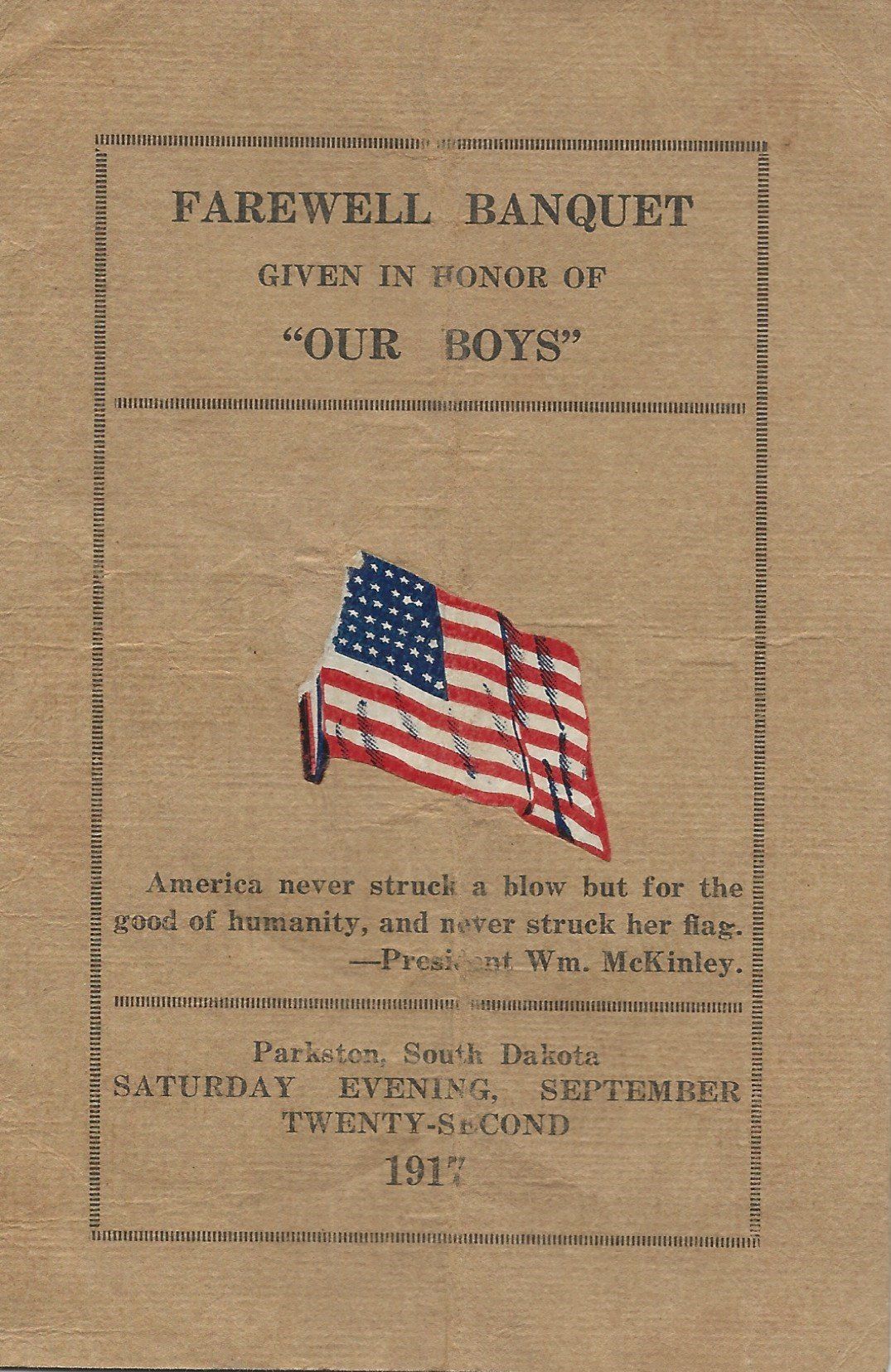
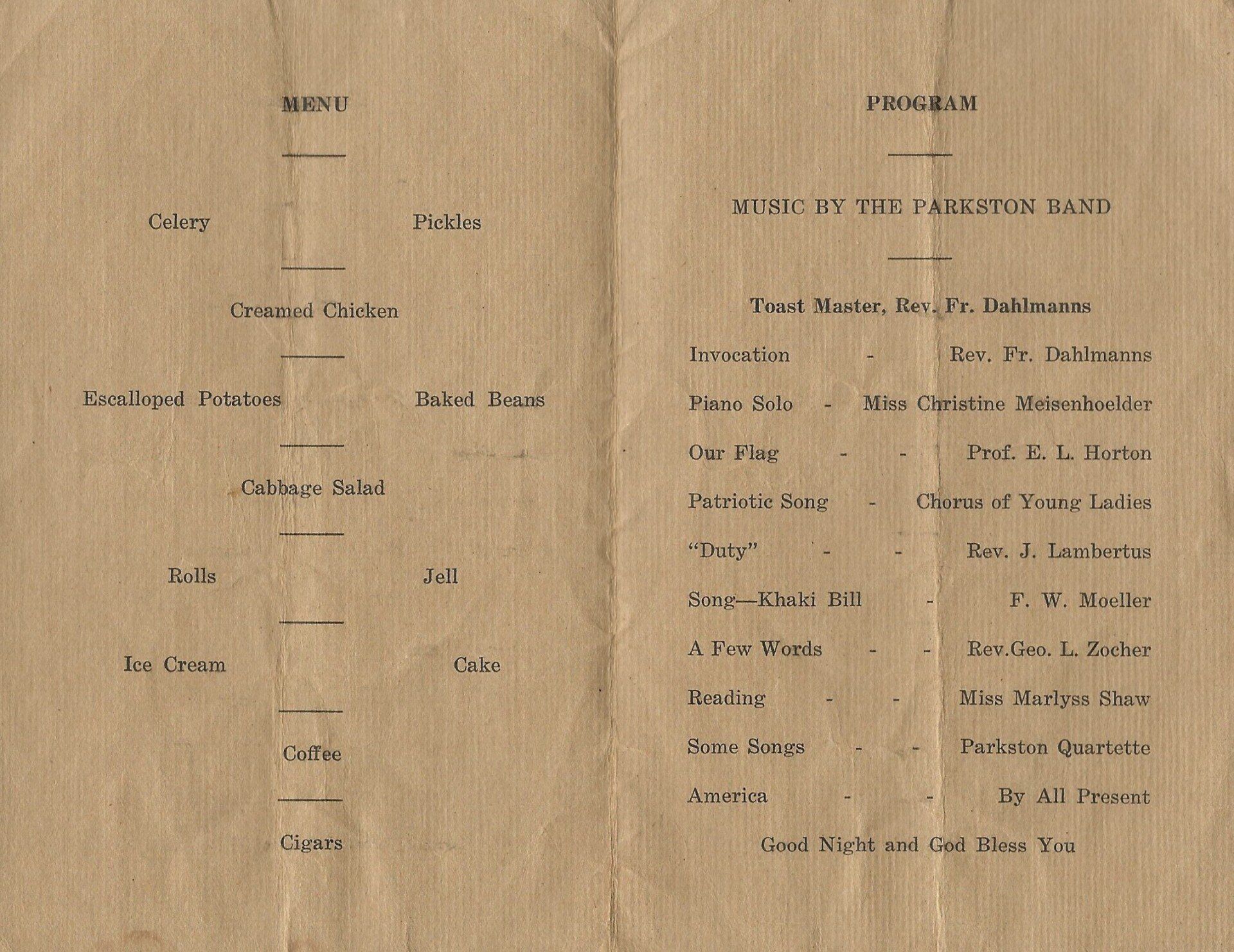
The people of Parkston gave the boys a “Farewell Banquet.” It was a high time for the boys, they had a special mission, according to President Wilson, “to make the world safe for democracy.”
Leo Wermers, John Ebersdofer, Francis Fix, Mathias Baltes, Orville Furr, Caleb Brink, Elliot Stanley, Henry Eimers, and Bernie “Breezy” Shields were George's buddies and now comrades. In his letters to Grace he referred to them as the "home boys."
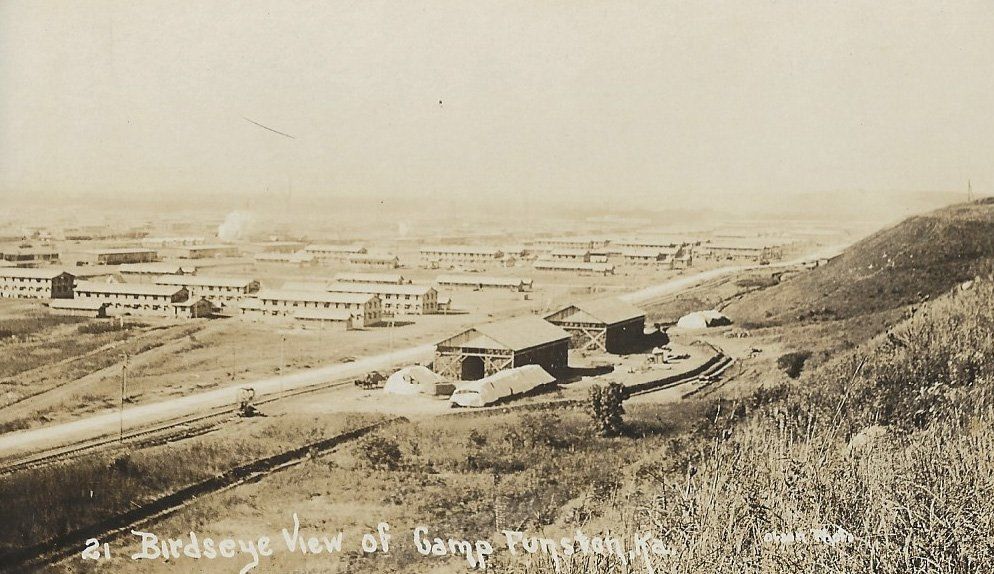
George and the “home boys" along with young men from the Milltown Colony arrived at Camp Funston, Fort Riley, Kansas in September, 1917. Their training lasted until the spring of 1918. Camp Funston accommodated over 50,000 men from the Midwest. George writes to Grace in 1917, “there are all sorts of people here, even some Negroes.”
The camp was divided into divisions and Battalions. George, Henry Eimers, Orville Furr, Leo Wermers, Mathias Baltes, and Breezy Shields were assigned to the 89th Division, 342nd Machine Gun Battalion.
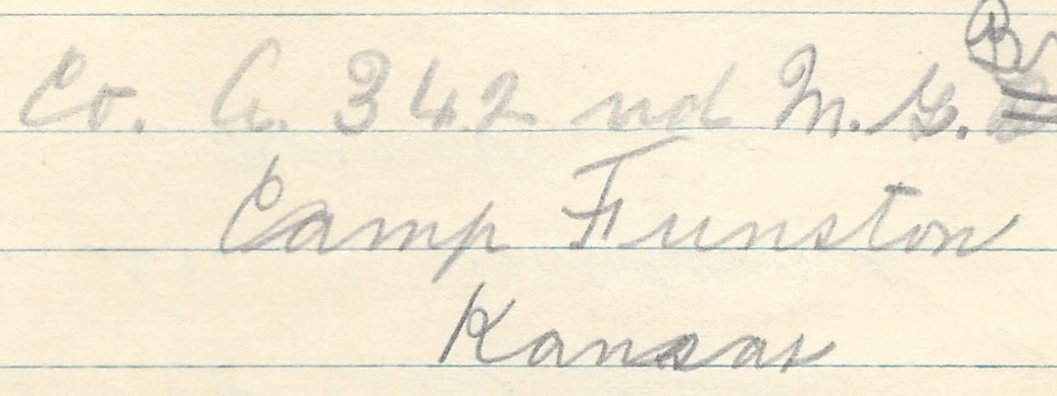

George's handwritten note to Grace. Circa, 1917
After his arrival, George described life at Camp Funston in letters dated 1917.
“The colony boys were sure feeling blue. They took them away when we got off the train and I haven’t seen them since!
I am not as lonesome as I thought I would be. Got vaccinated yesterday, so I don't have to drill, I was examined for spinal meningitis. They take a piece of wire and tie some cotton to it and run it up your nose as far as it will go. I felt as if it went clean down to my stomach! (Author’s note: the disease was rampant at Camp Funston.)
We have to wash our own dishes, make our own beds, and sweep under the cots. When I come home, I will know how to do housekeeping!
I got my clothes the first day, that is what I could get to fit me.
I am looking out the window and watching men drill, it is really some mob!
I will send you pictures, when I can."
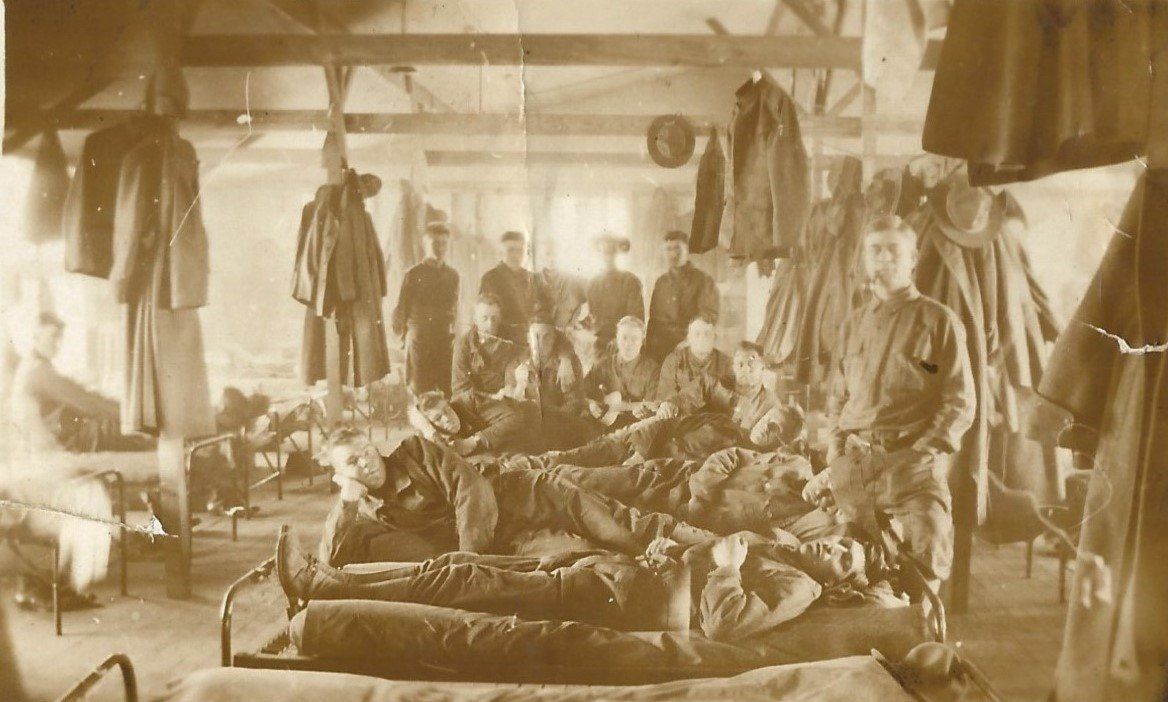
Picture of George's barracks, men unidentified. Circa, 1917
In his letters he mentions the "home boys."
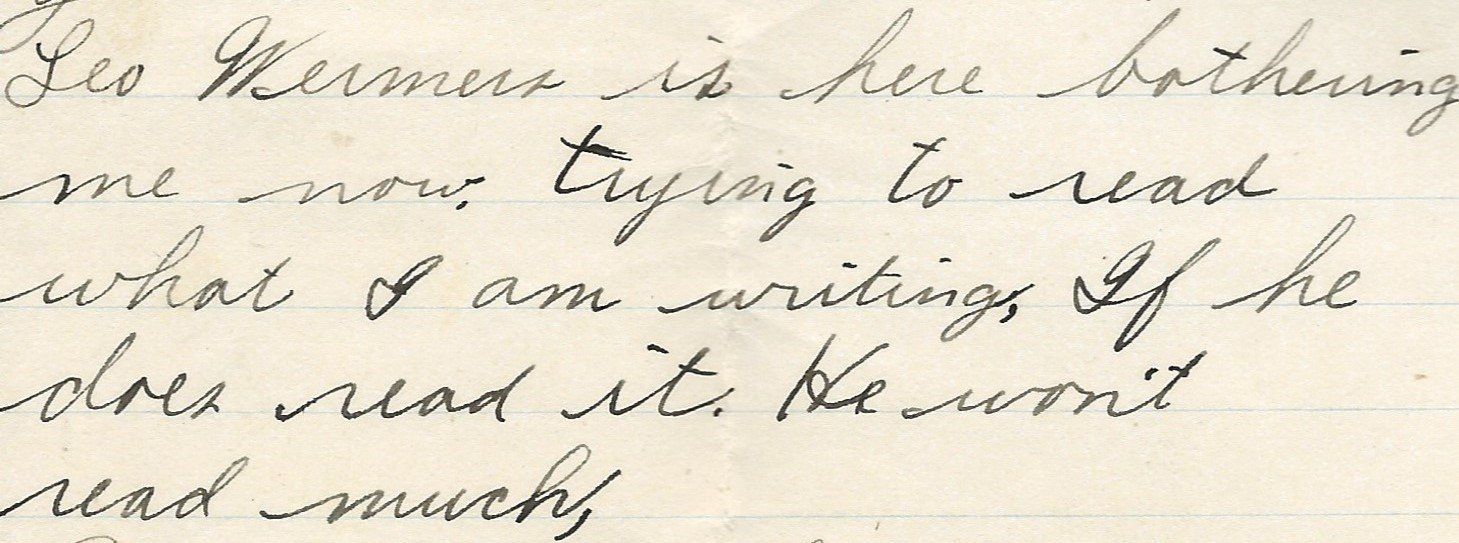
As a farm boy, George knew how to drive horse and mule teams, and how to take care of the animals. His classification in Company “A," 342nd Machine Gun Battalion, 89th Division was “Waggoneer” as well as one of the other “home boys," Mathais Baltes.
George writes in 1917, “Tomorrow will be a busy day for me, Wednesday is going to be a special inspection. We have to wash and oil the harnesses, wash the wagons, and trim up the mules and horses. Also trim up myself, not a speck of dirt to be seen.”
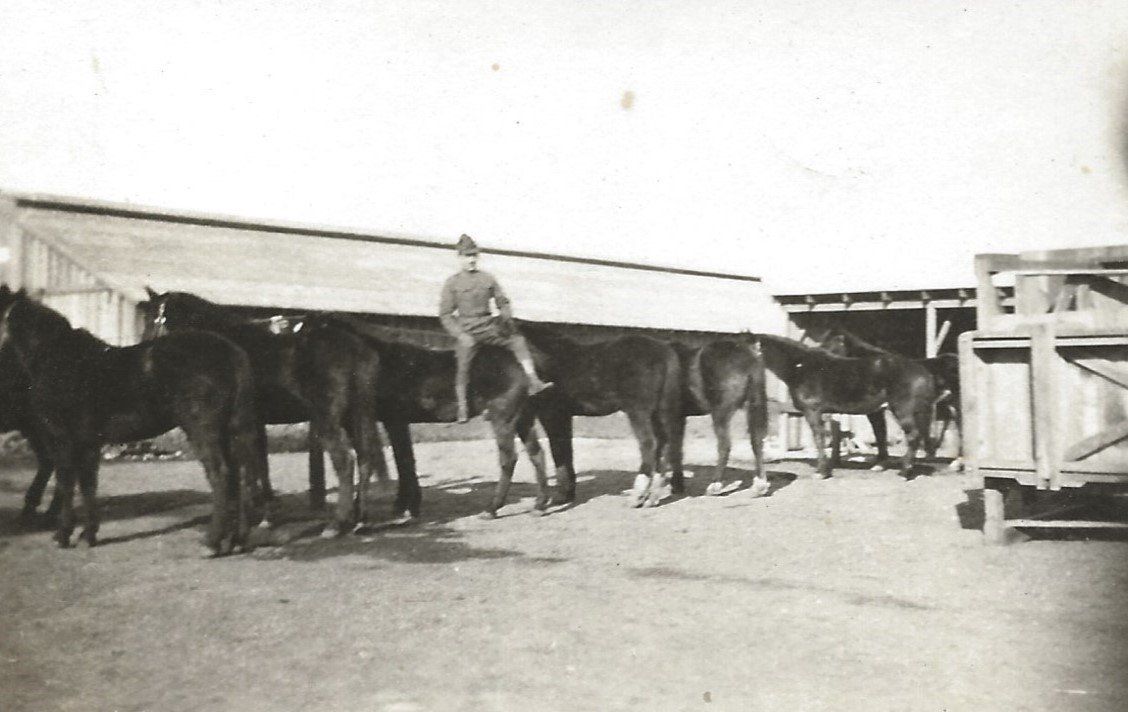
George seated on horse, Camp Funston. Circa, 1917
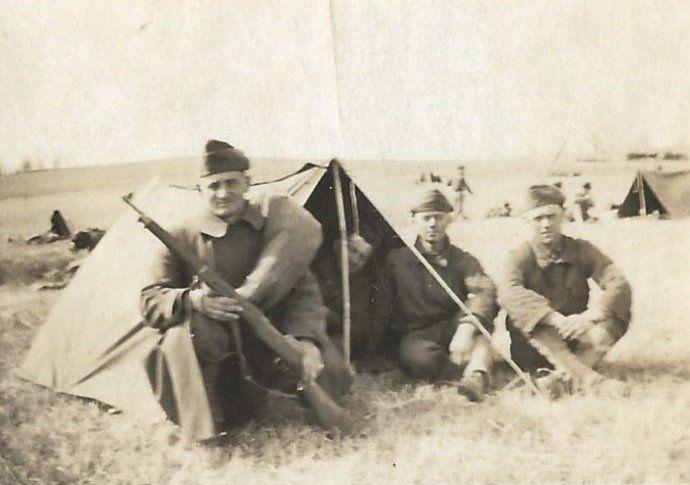
In addition to his duties as Waggoneer, George also trained as a regular soldier. “Am sending a snapshot I had taken while out on a hike. Those are the kind of tents we live in when we are in the field. I have mine strapped on my shoulder, the way we carry them.” Others in the picture unidentified.
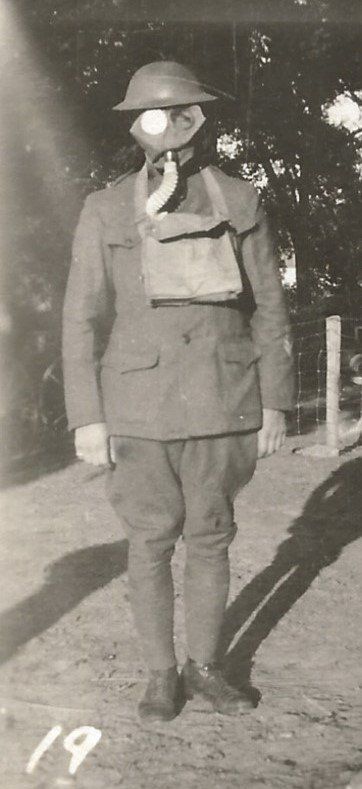
Part of the training included the use of masks in case of a deadly mustard gas attack.
“You have to put them on quick, when the signal is given or you’ll end up with your toes curled," George wrote.
George in gas mask. Circa, 1918
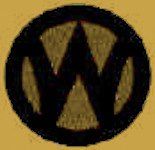
89th Division insignia.
Holidays were always a lonesome time for the boys. The army did what it could, as George writes about Thanksgiving: “The soldier boys got a good dinner. Pumpkin and apple pie, cranberry sauce, nuts and candy wasn’t that good?”
But nothing was better than packages and cards from home. George continues in the letter dated November, 1917, “And the box from home, I’m about ready to bust! I wonder where my next Thanksgiving will be. I am getting a little fat from all this food.”
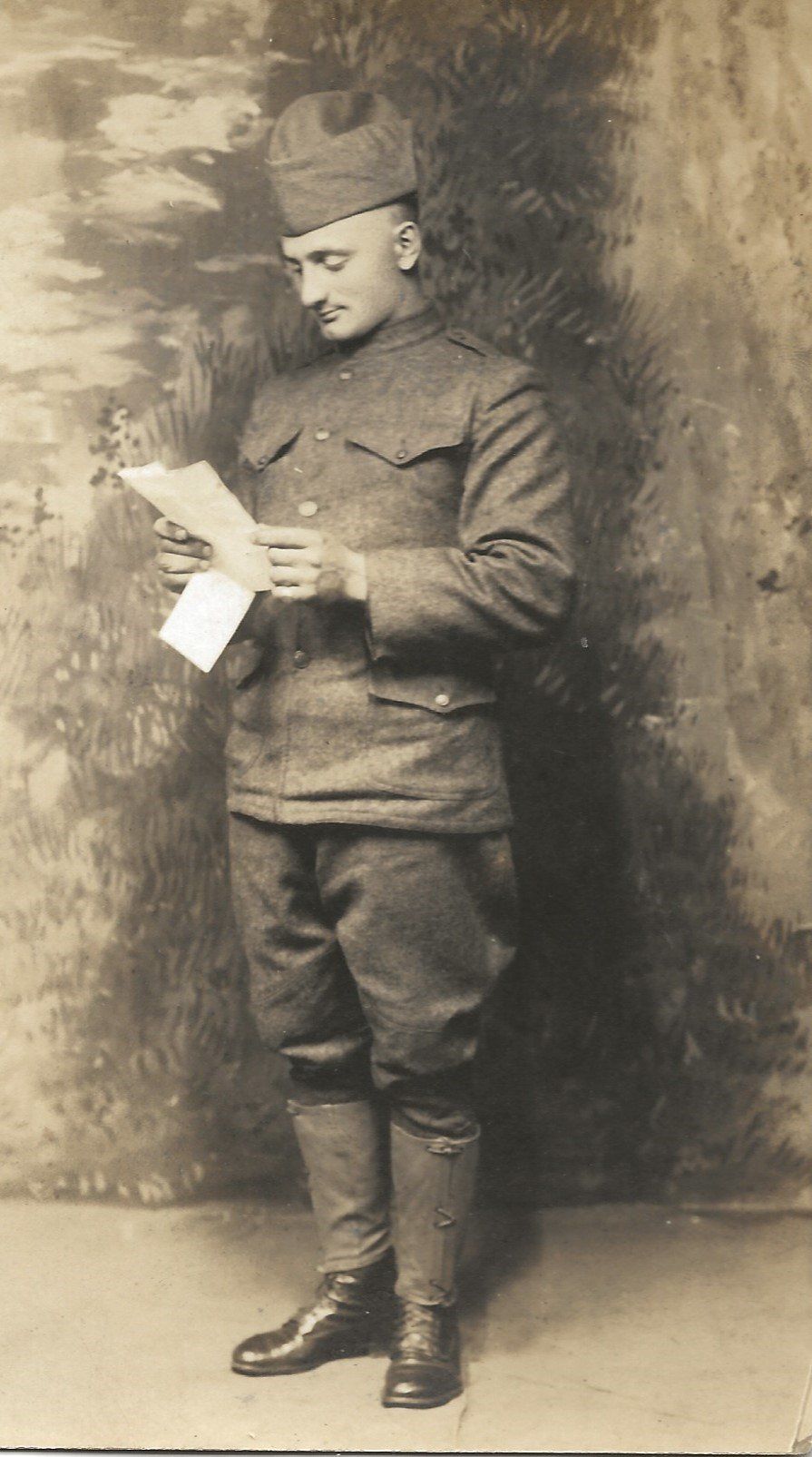
George reading a letter from home. Circa, 1917
In December, he comments about his packages, “I received six boxes for Christmas, most I ever got! I wish I could be a soldier all the time. Ha. Ha.”
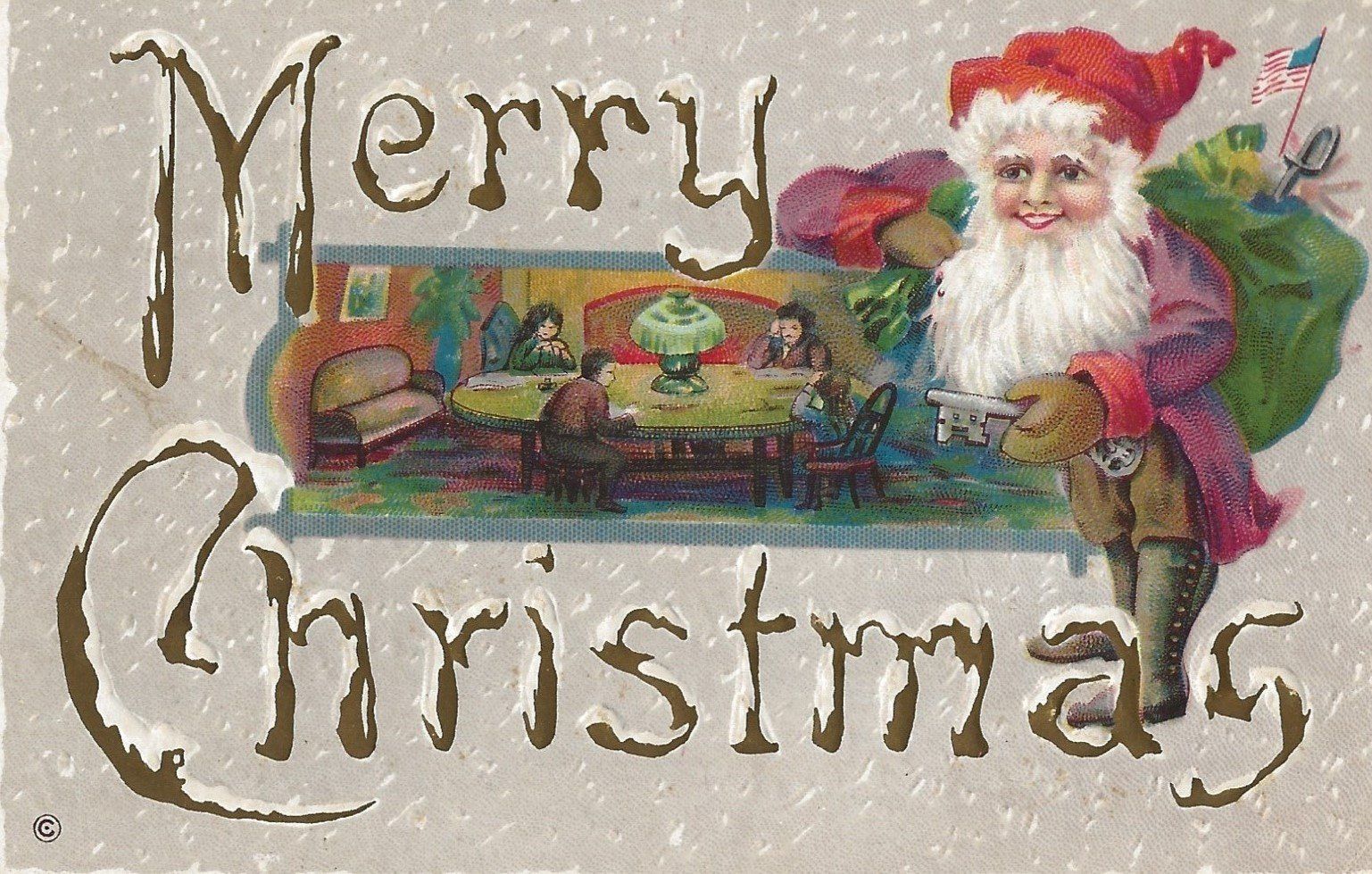
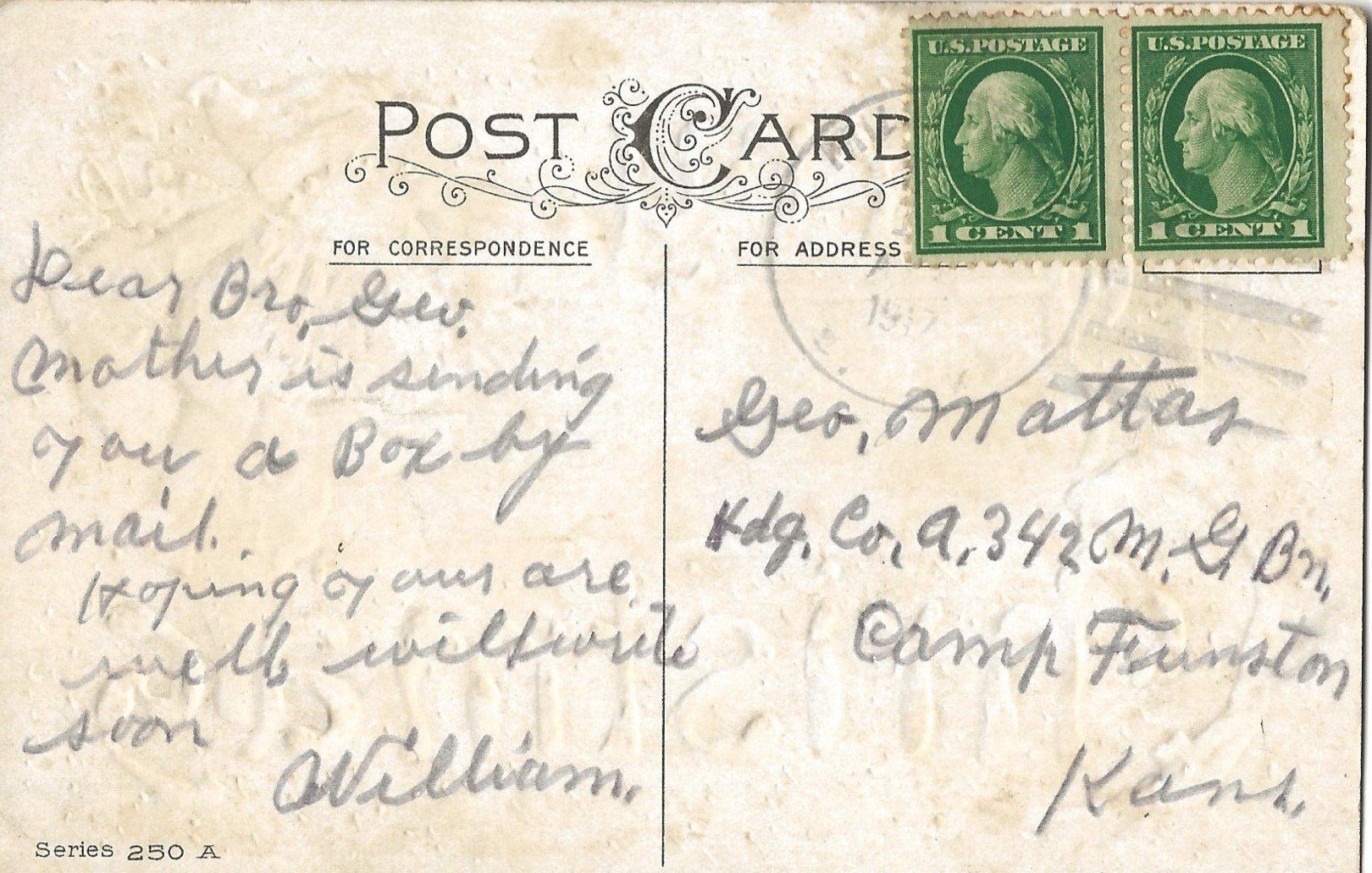
George and the “home boys” were still in camp in April, 1918. Sarah Hayne, who taught many of the Milltown boys, sent an Easter card to all of them.
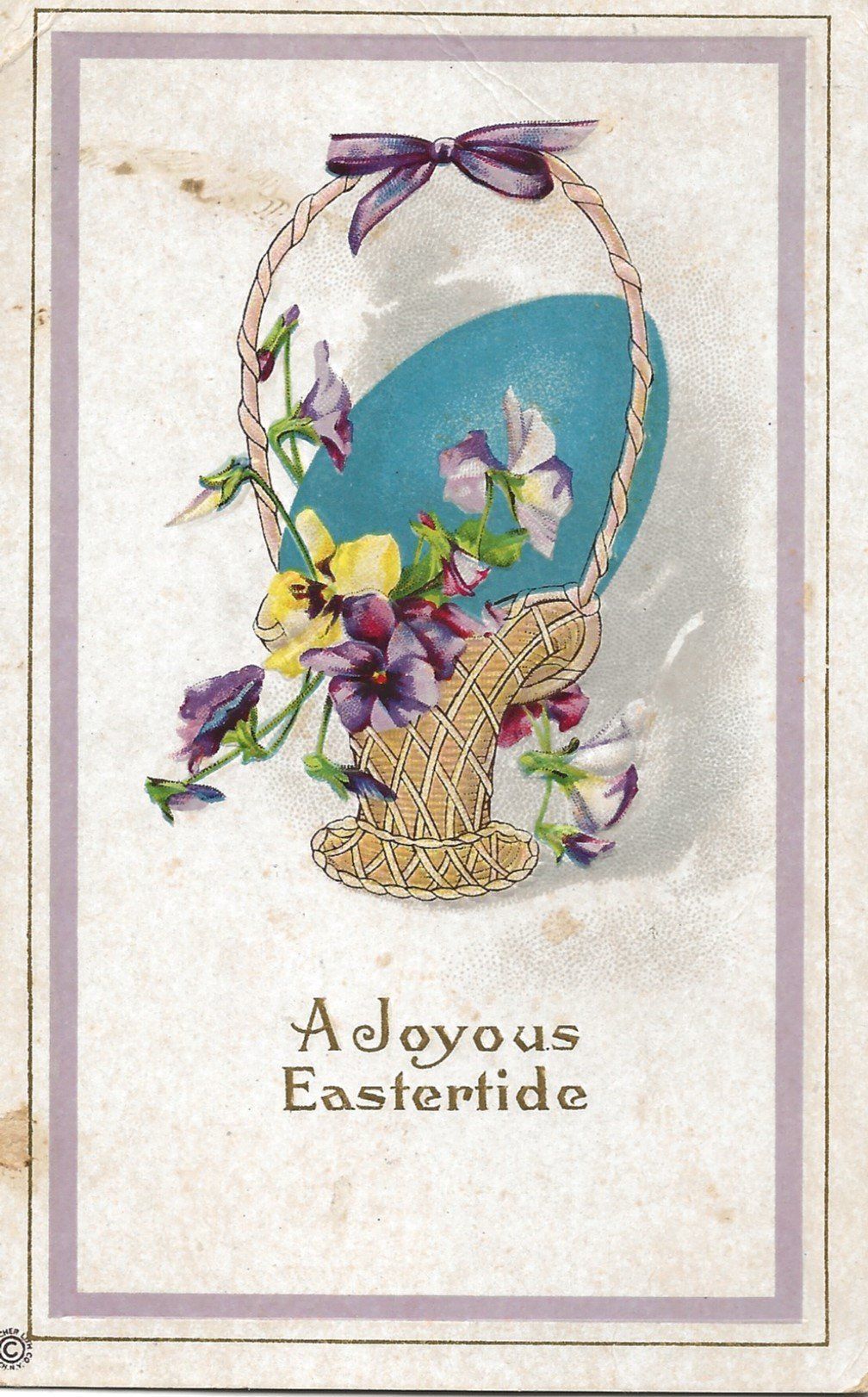
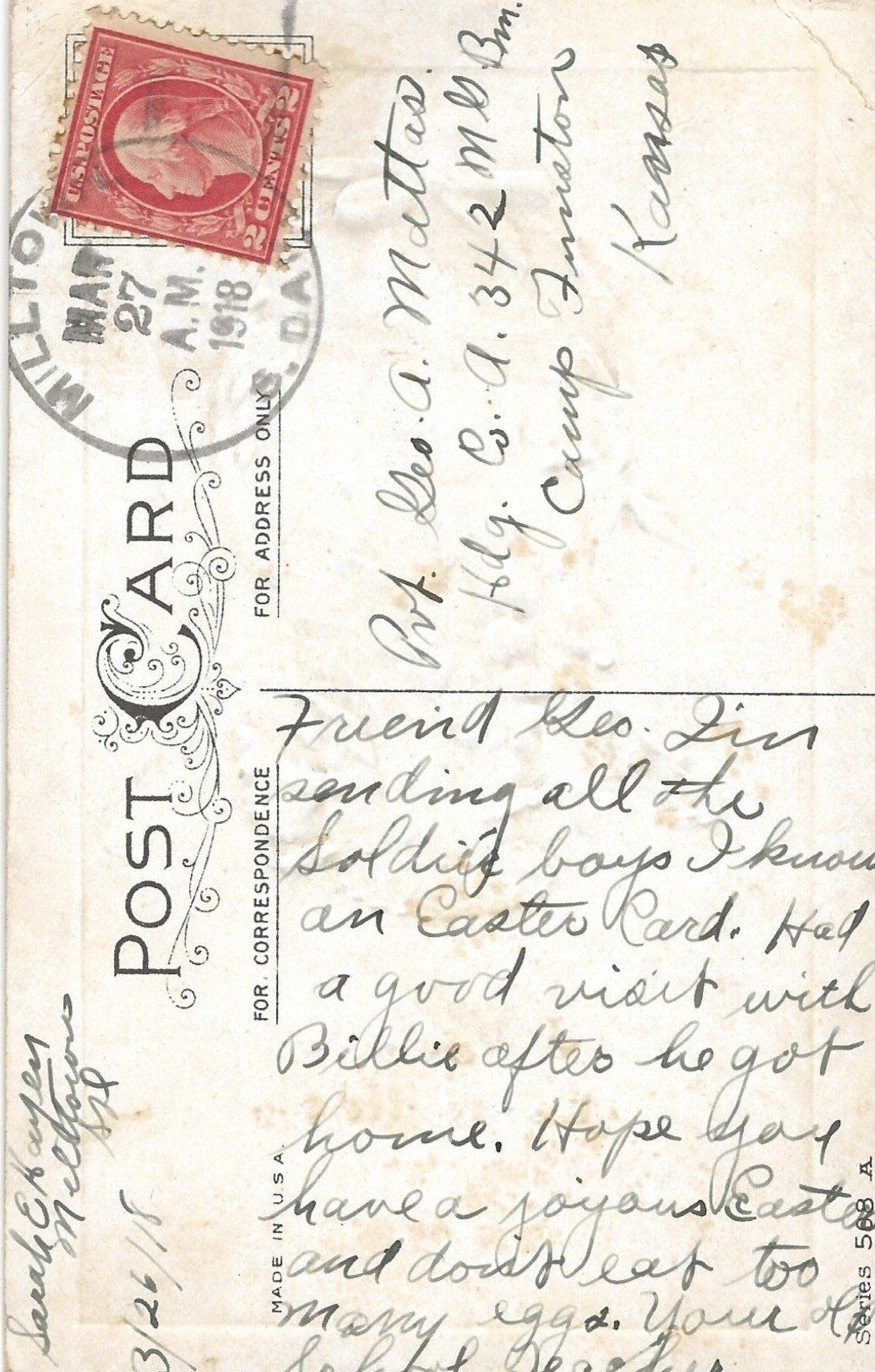
May, 1918 the word came. It was time for the “home boys” to go. They had been spilt up but they were ready to fight the “Kaiser.” George's letter from Camp Funston.
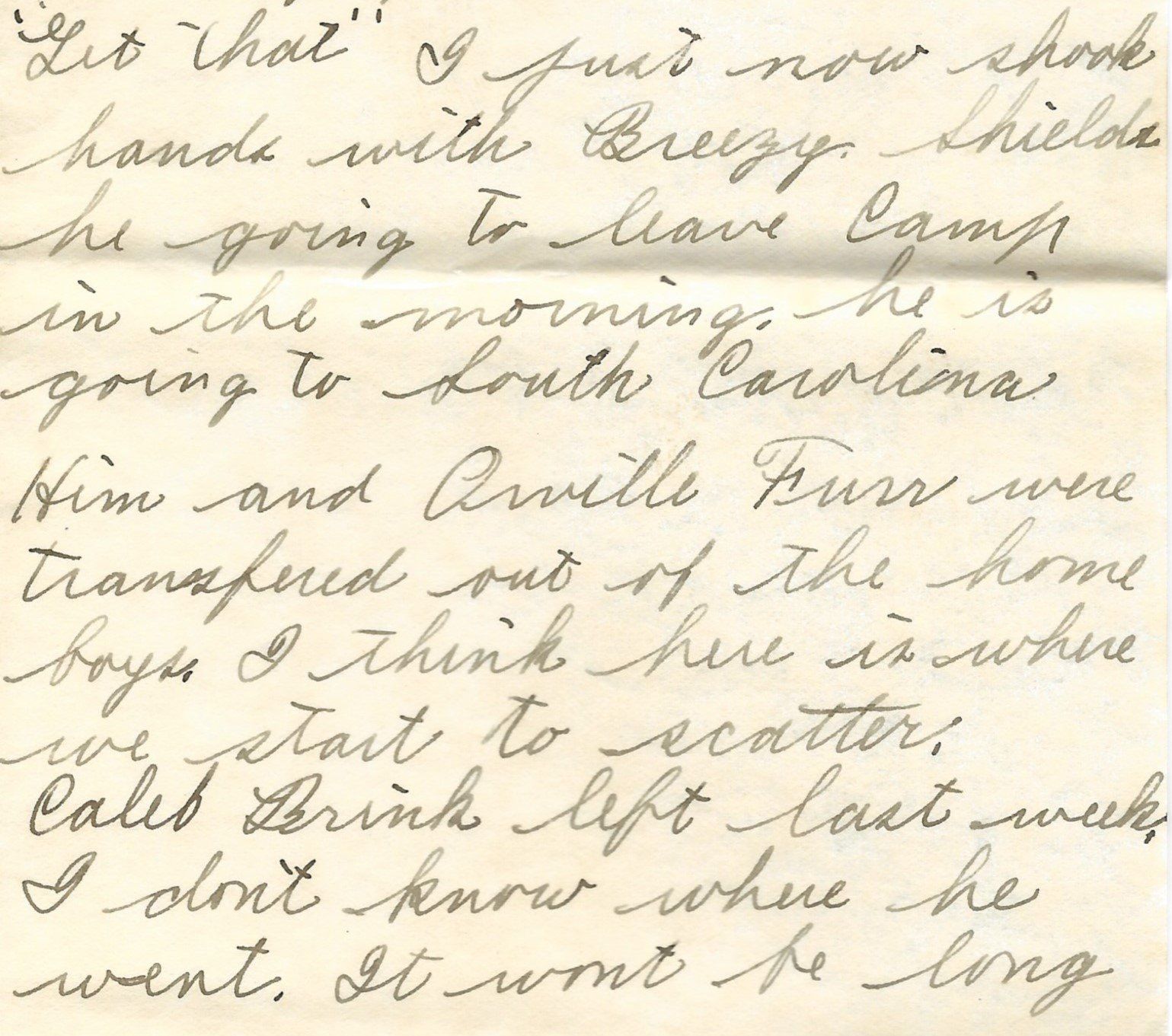
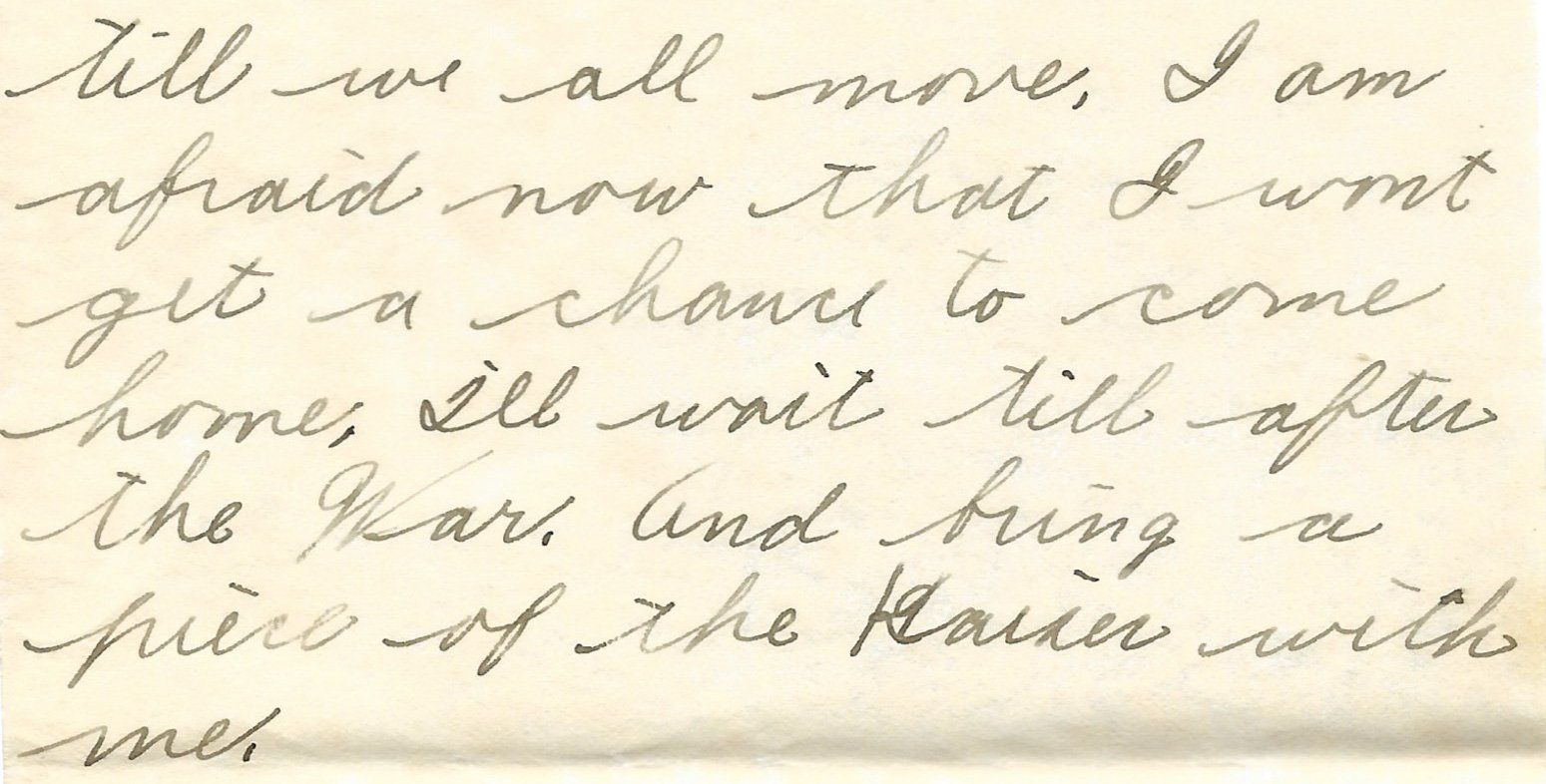
The division left for Camp Mills via Hoboken, New Jersey then on to France commencing June 3, 1918.
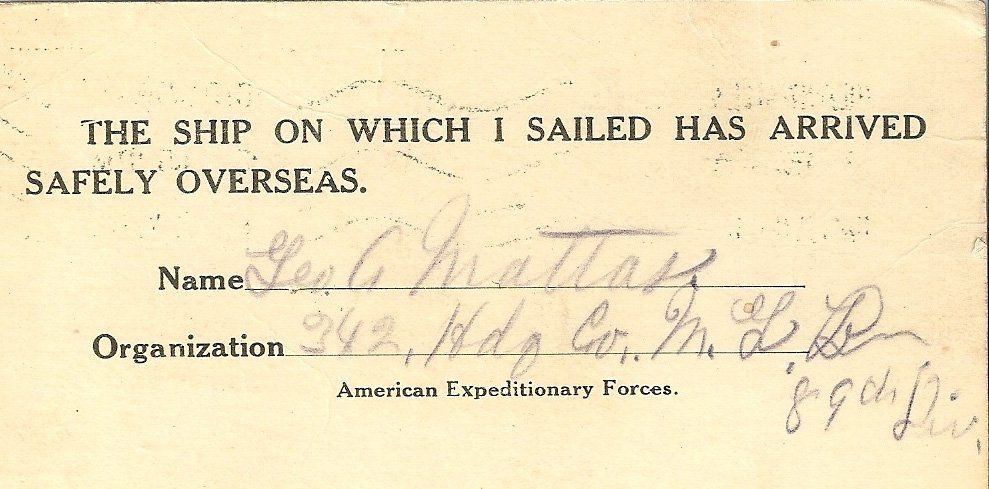
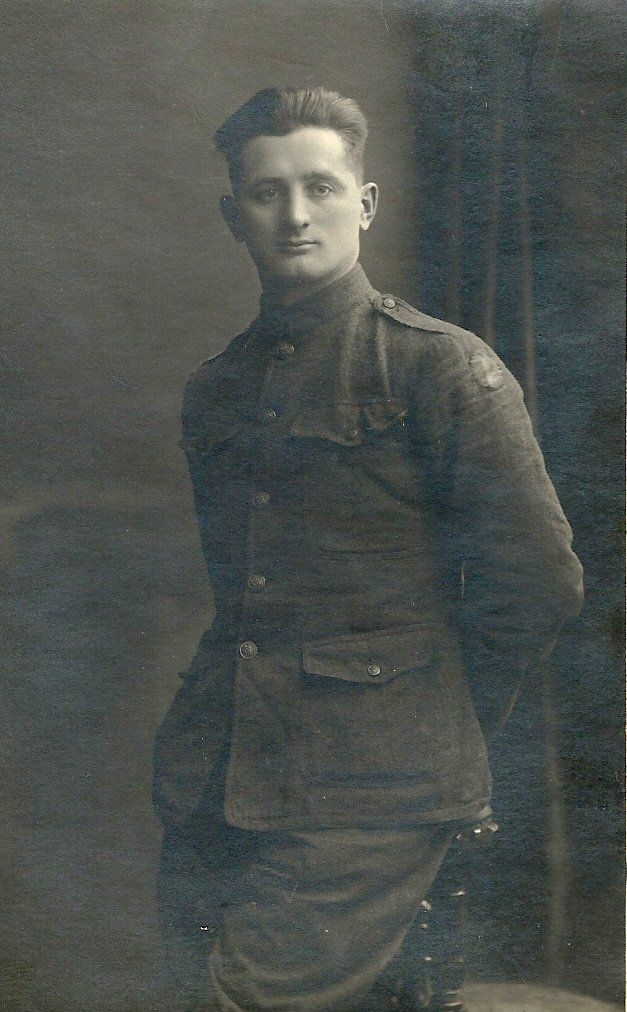
George. Circa, 1918

There were only two letters that came to Grace between June and November of 1918. George wrote of home and the dances he missed and friends left behind. During that time, he was part of the horrible war, serving, with the other ‘home boys” that were part of the 342nd Machine Gun Battalion. The following accounts and pictures are taken from the “History of the 89th Division," by George H. English, Jr., published by The War Society of the 89th Division, 1920. The book is part of the Adkins Family Archives.
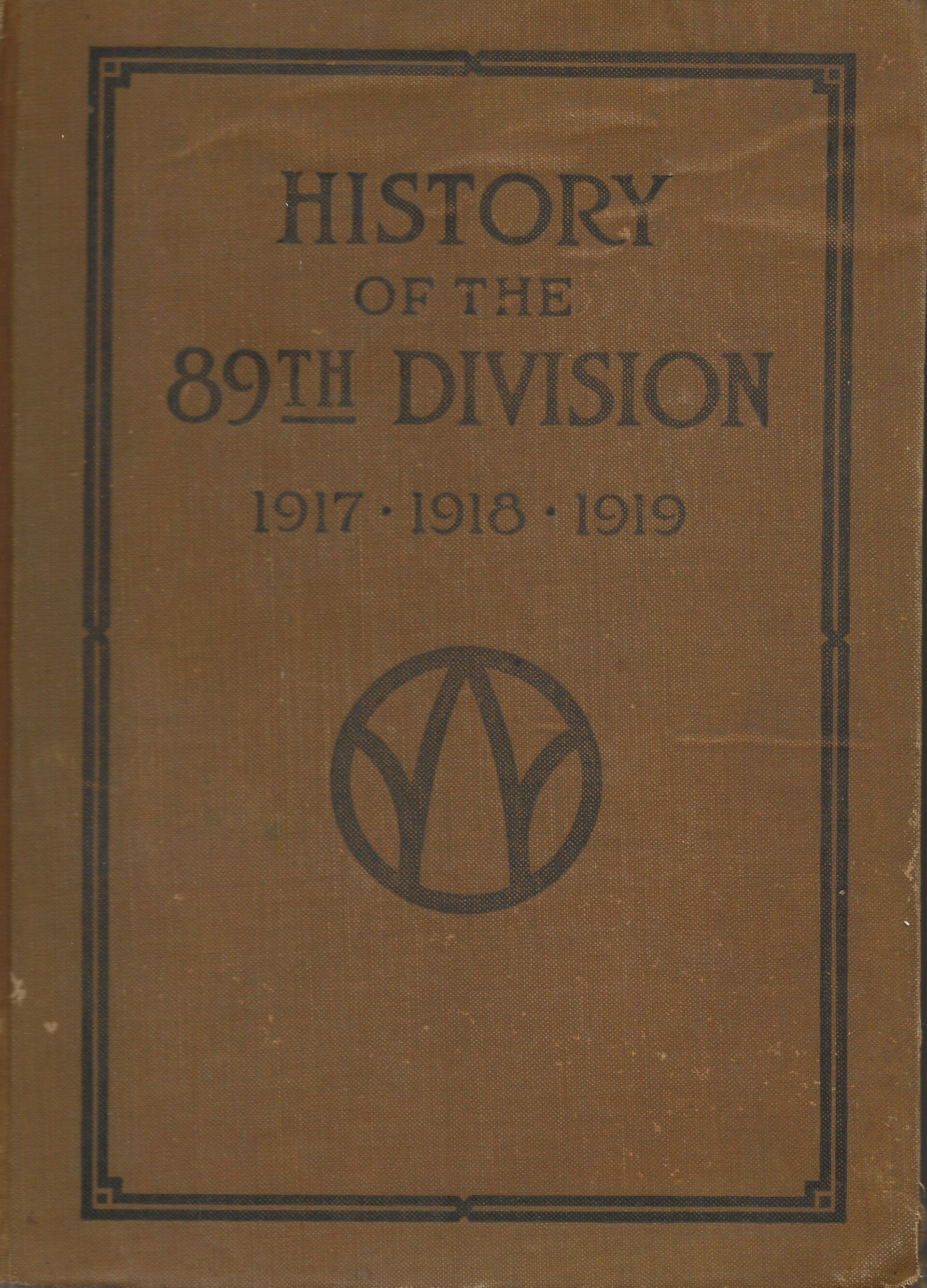
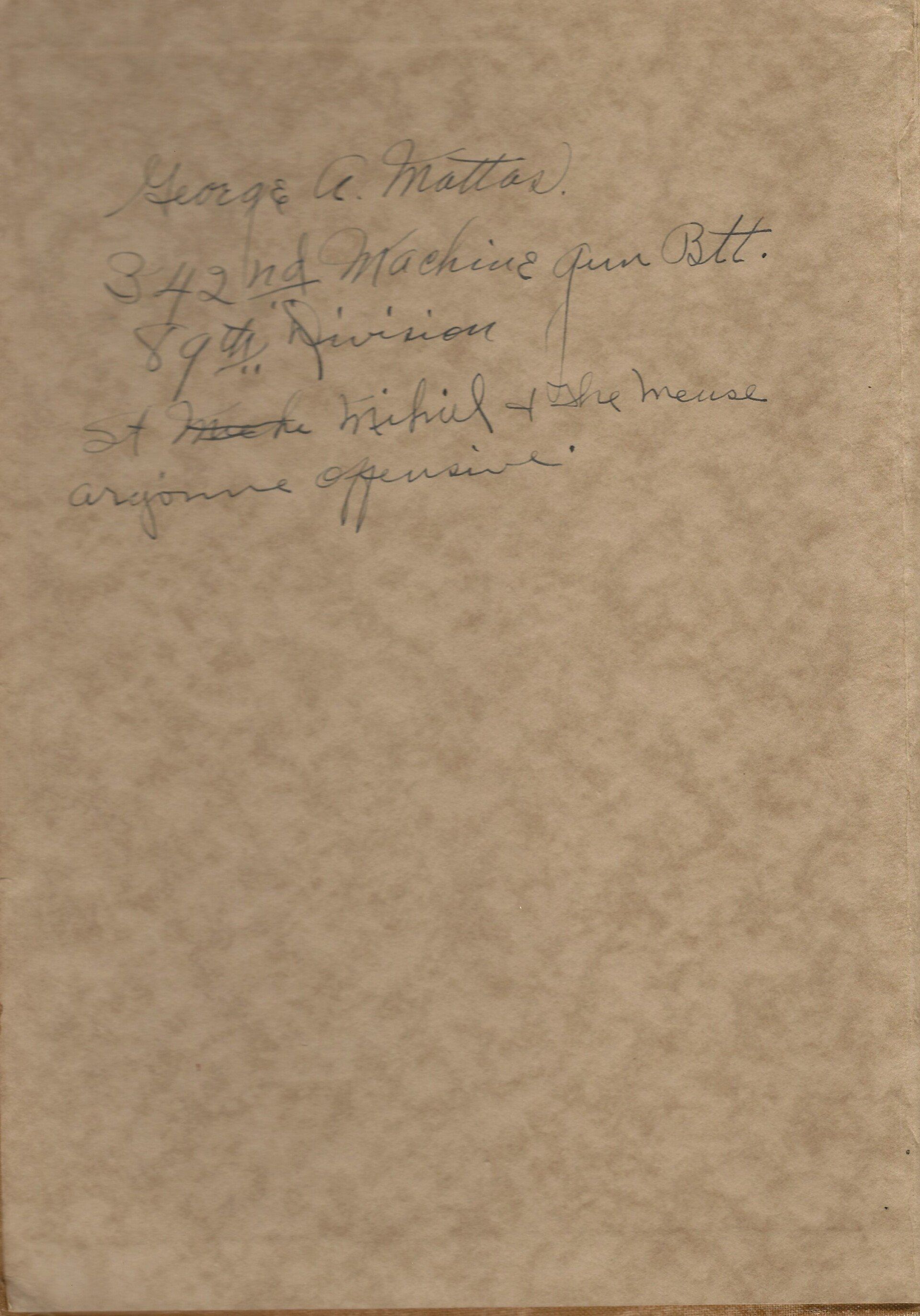
Inside cover of book.
George A. Mattas
St. Mihiel
and the
Meuse - Argonne
Offensive.
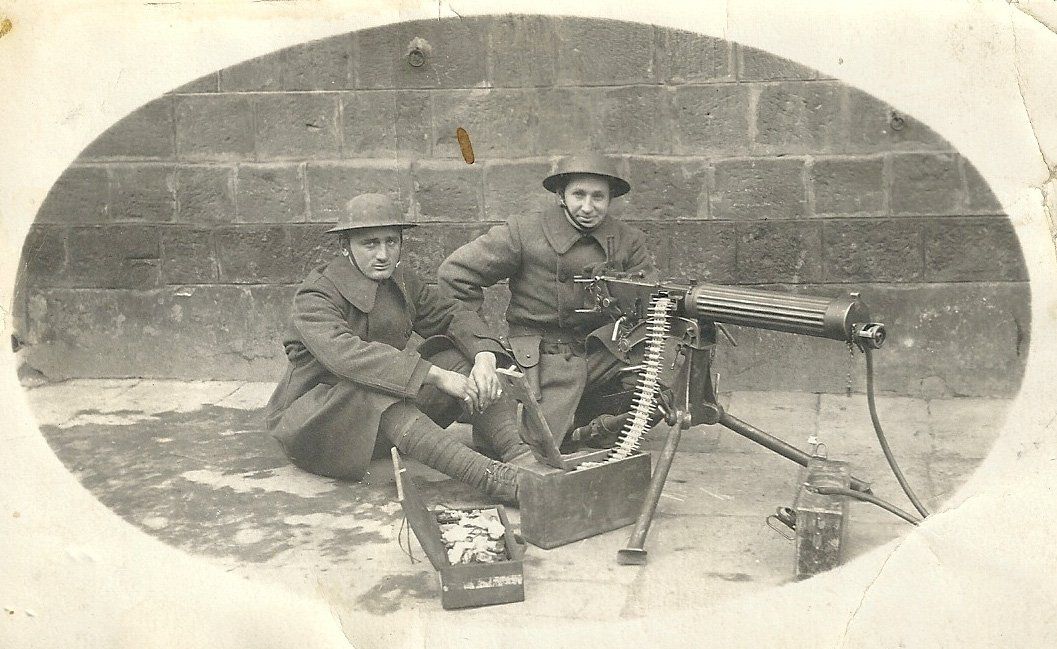
George left with unidentified soldier. Circa, 1918
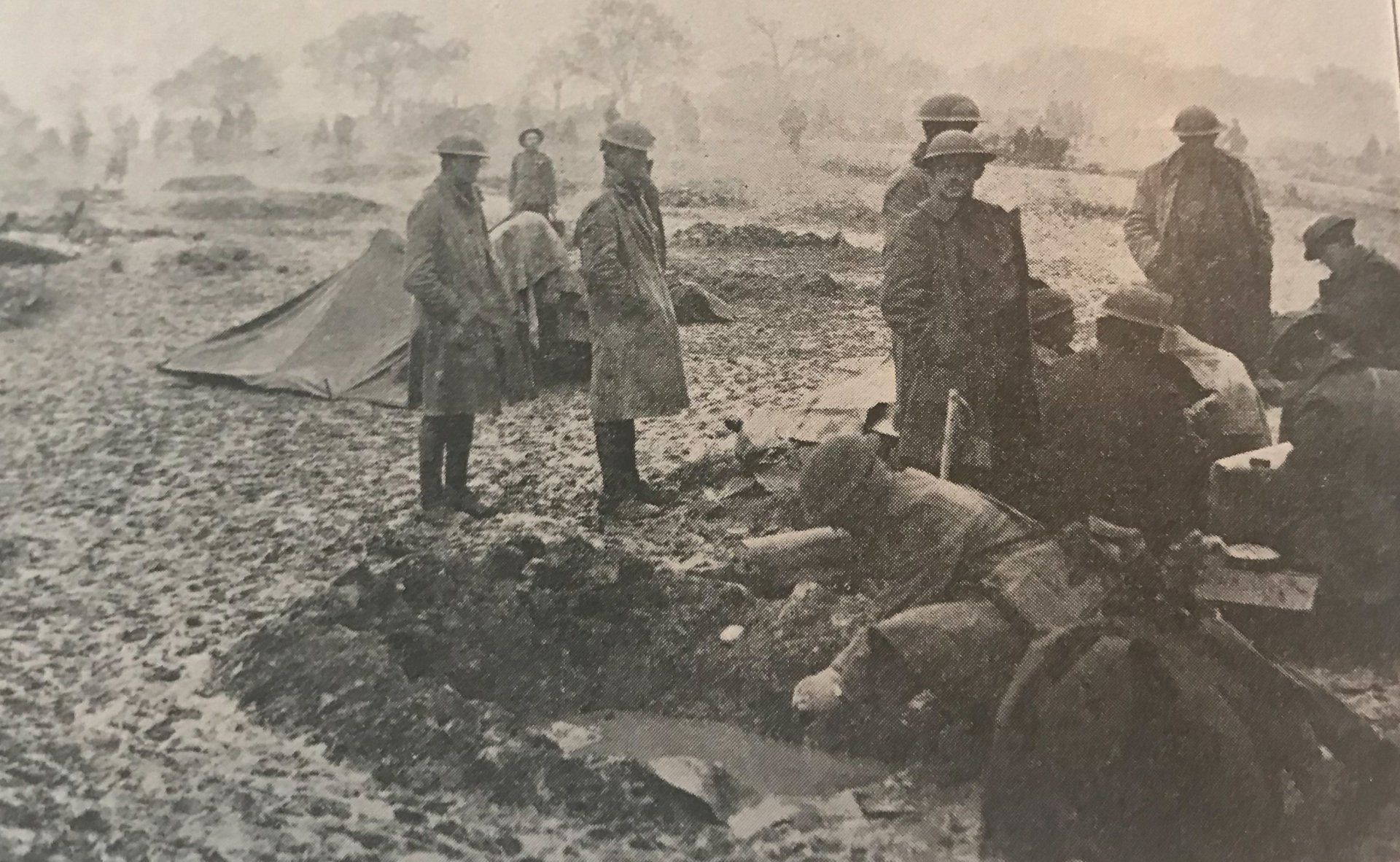
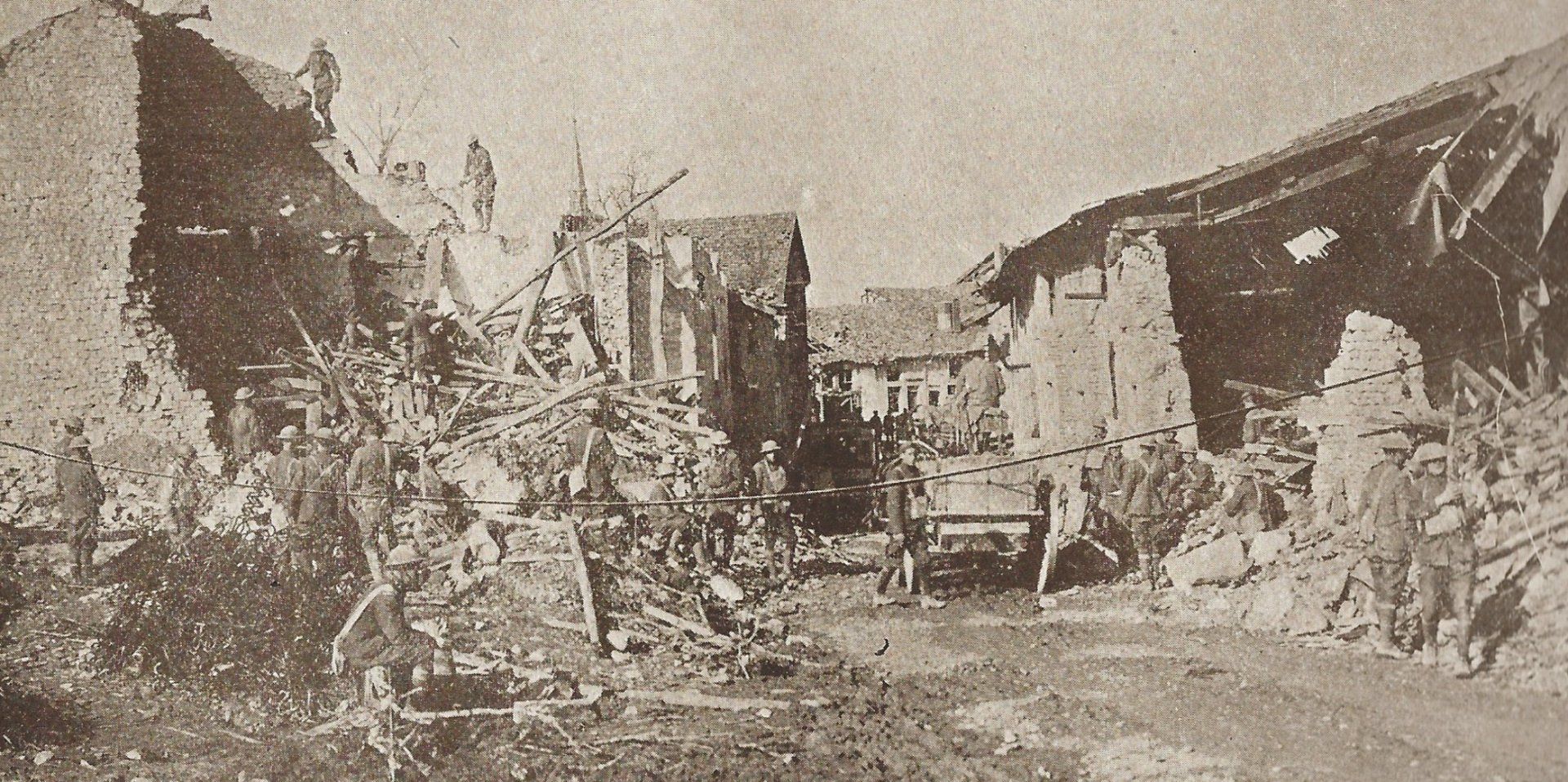
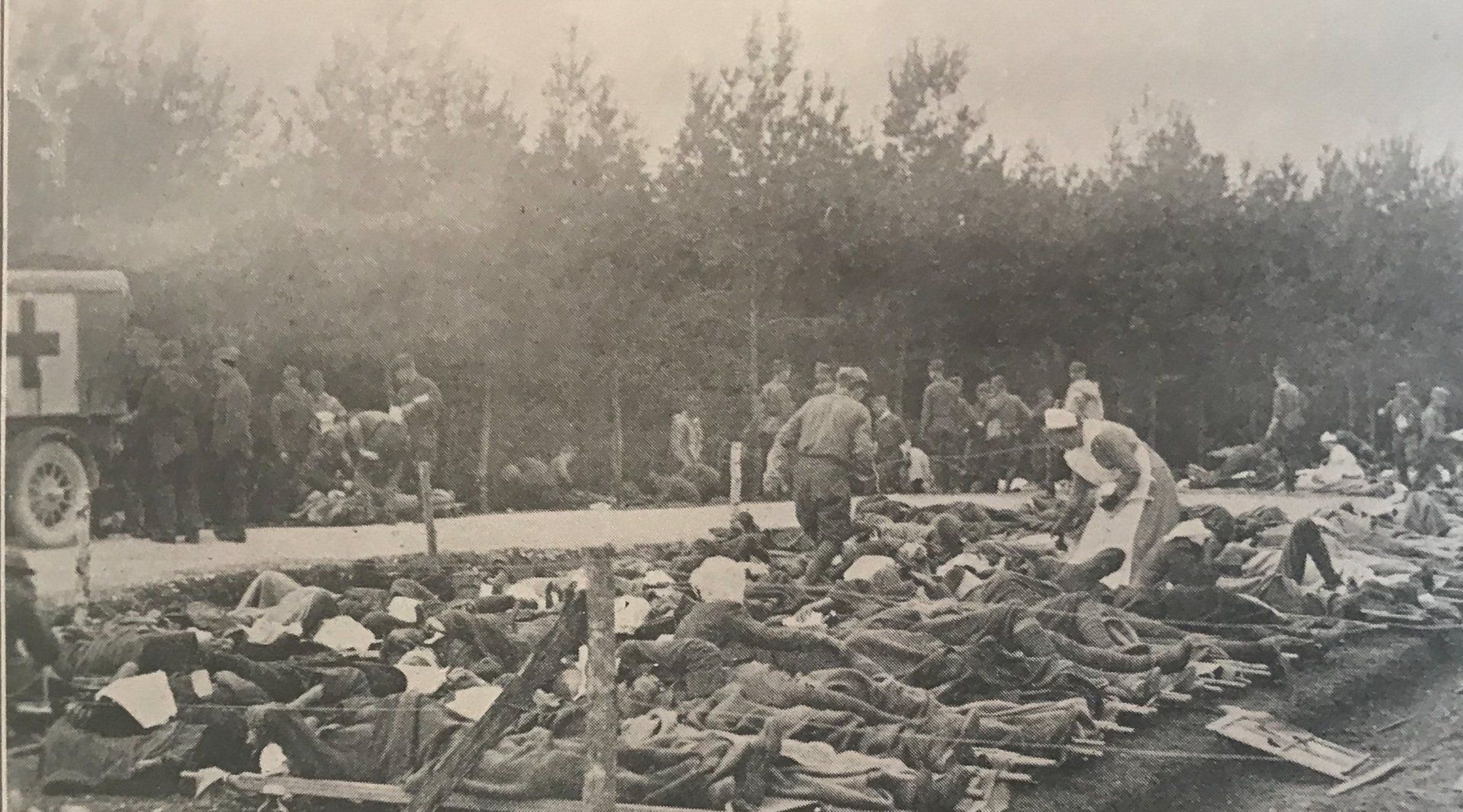
Pictured from top to bottom: Mud Camp at the Meuse-Argonne Offensive showing soldiers trying to dig fox holes to sleep in; town during the St. Miheil Offensive; victims of the mustard gas release during the offensive.
During the St. Mihiel offensive, George and his division were in line fighting continuously for 55 days. In the Argonne, the division was in line for twelve days and then continued in the big drive of hard fighting for the last eleven days of the war. Casualties: killed - 1,129; wounded or gassed – 5,761; missing - 58; prisoners – 5. None of George's “home boys” were on this list.
The war ended on the eleventh hour of the eleventh day of the eleventh month in 1918.
George writes to Grace, "At last the War has ended and I am alive. So will see you sometime again."
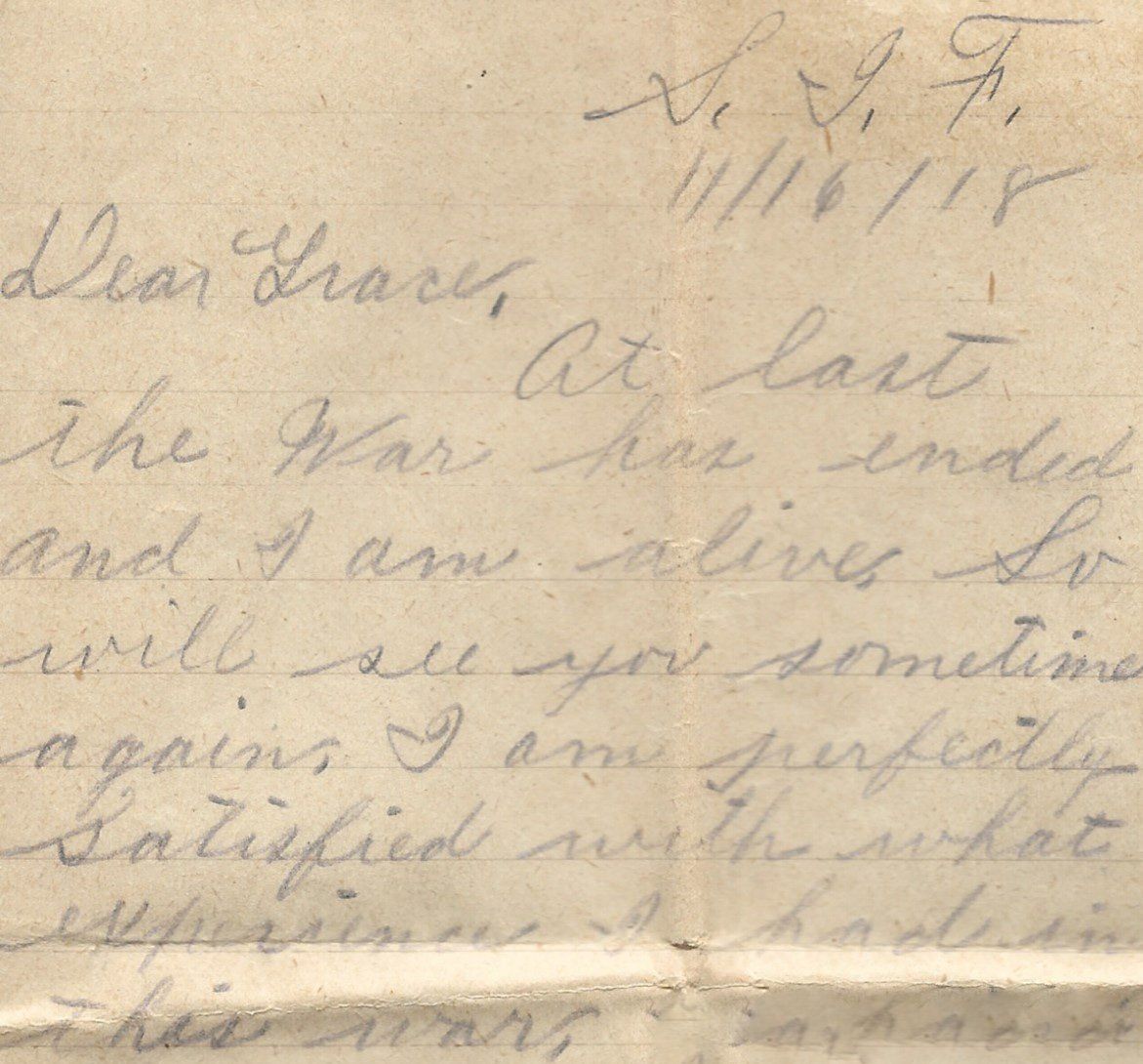
He continues on for several pages.
“Gee, it seems funny not to hear the big guns roaring and the big shells not coming back at you. The nearest they got to me was kicking dirt in my face. I thought that was close enough to me. It’s a great game to play. You get him or he will get you. Well, I am glad its ended. Nothing better could ever happen.
He ends with, “Well I guess that will be all, just to let you know, that I am alive and well.”
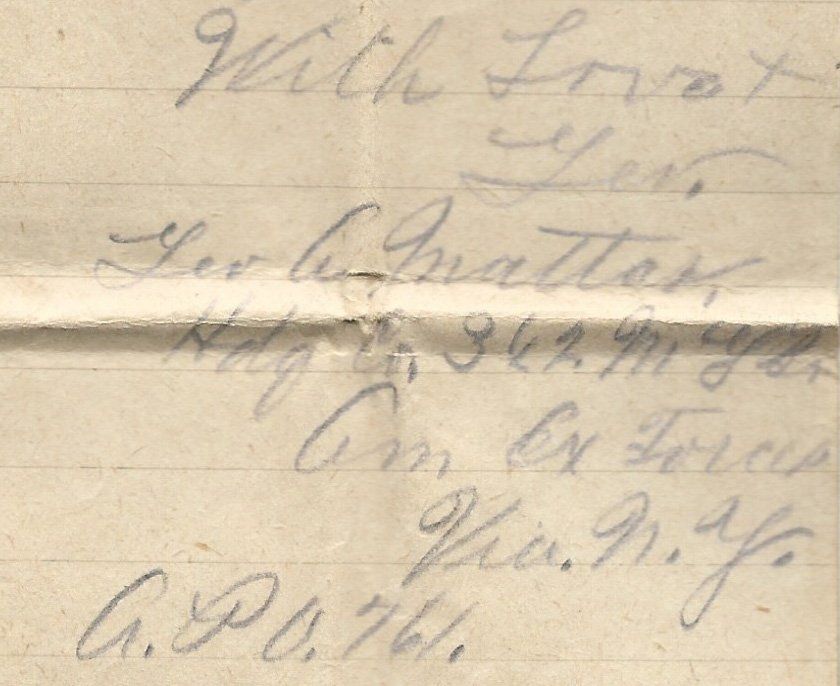
No matter how anxious George was to get home, duty wouldn’t let him go yet. Soon after the armistice, the 89th Division was selected to be part of the Army of Occupation in Germany. He was there until May, 1919. He continues to write to Grace.

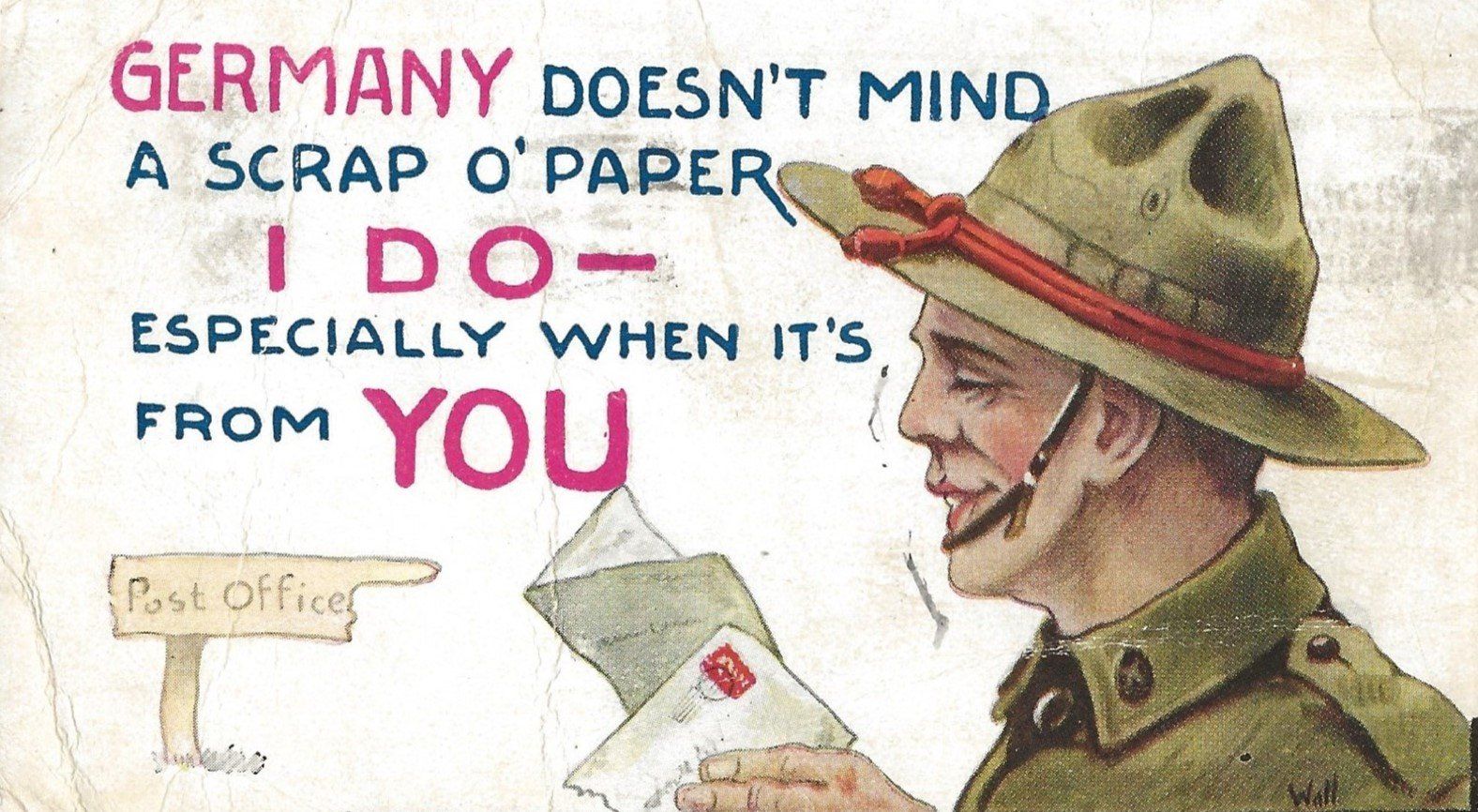
Finally, George boarded the ship that took him home. He and six of the “home boys” arrived in Parkstonon June 10, 1919. He remarked in a letter to Grace how small it seemed.

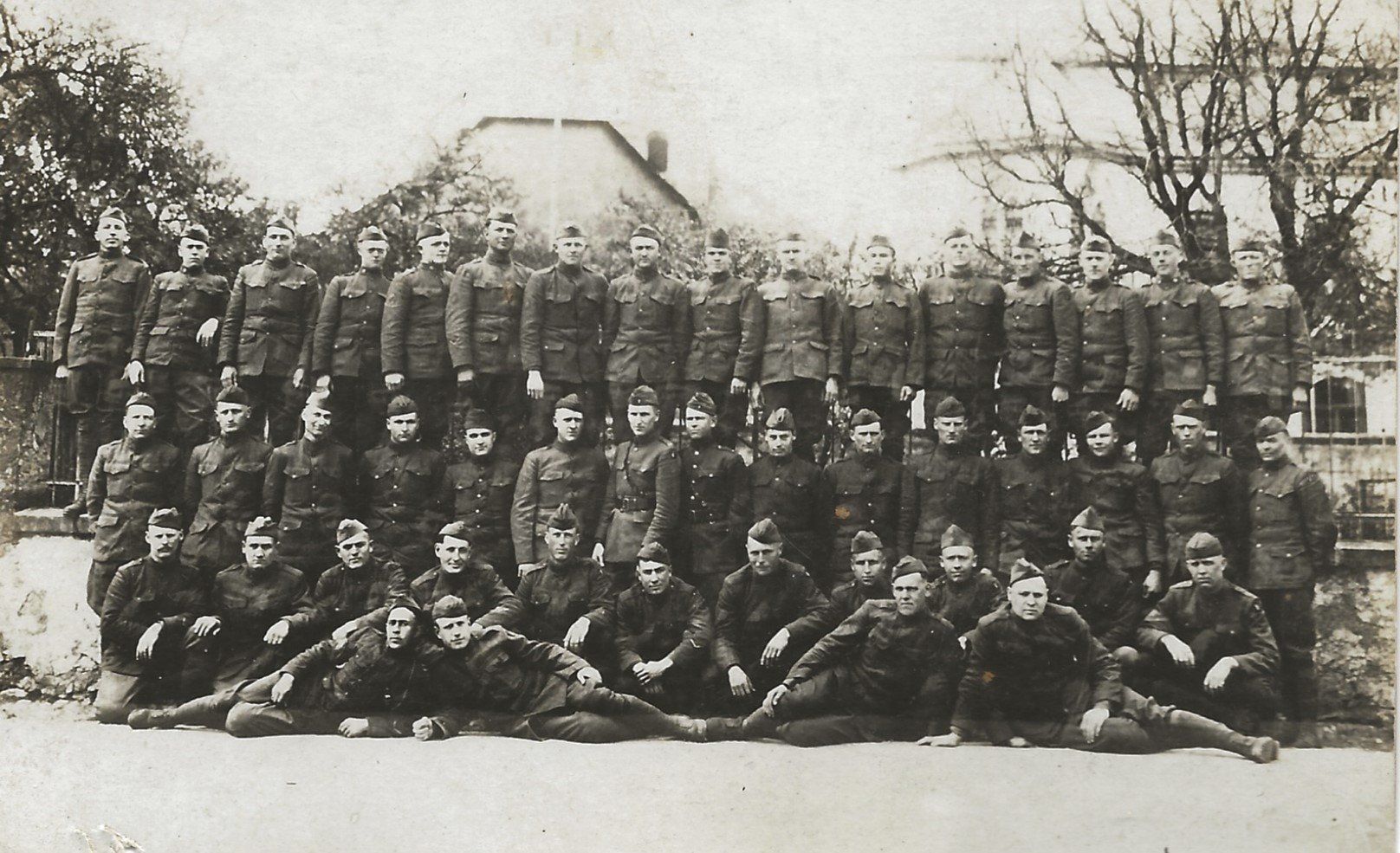
342nd Battalion, Company "A." George, 2nd row, 2nd from left.
Circa, 1918
